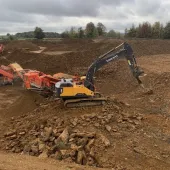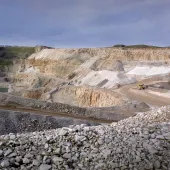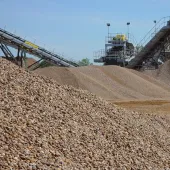Banks Mining to challenge Highthorn decision

Company registers intention to challenge to Secretary of State’s decision to refuse planning permission
BANKS Mining have registered their intention to challenge Secretary of State Sajid Javid’s decision to reject their Highthorn surface mine planning application.
The Co. Durham-headquartered firm gained unanimous approval for its Highthorn planning application from Northumberland County Council’s planning committee in July 2016, only for the decision to subsequently be called in for review by the then Department for Communities and Local Government, which then led to a public inquiry into the project in 2017.
Last month, Mr Javid chose to disregard the recommendation of the planning inspector appointed by the Government that the Highthorn scheme should be allowed to go ahead.
Now, however, Banks Mining have notified Mr Javid of their intention to lodge a challenge with the High Court against his decision on the grounds that there are serious errors in the legal basis on which it was made.
Gavin Styles, managing director of Banks Mining, said: ‘We have been advised that we have strong legal grounds for registering this challenge and will be working to get a decision from the High Court as quickly as possible.
‘The approach adopted by the Secretary of State in reaching his decision could have far-reaching unintended consequences for all hydrocarbon extraction industries, such as coal, gas and oil, including the shale gas industry, as well as other sectors of the minerals extractive industries and major infrastructure developments, such as road, rail and air projects, and could significantly impact on UK industry’s competitiveness against overseas rivals.
‘We fully recognize and accept that there needs to be a stable transition to a low-carbon economy, and are already working successfully within the framework which is driving the phased reduction of coal from the electricity generating system, but there will remain a clear and recognized need for coal during this phase-out period.
‘In 2017 coal demand in the UK was 14.4 million tonnes, 8.7 million tonnes of which was used for electricity generation and the remainder within a wide variety of important domestic foundation industries, such as the manufacture of cement and steel.
‘Although this is a record low for coal generation, this demand is five times more than the UK is able to supply and nearly 20 times the planned annual production at Highthorn, and the shortfall was met by a doubling of coal imports from Russia and a quadrupling of imports from the US.
‘The necessity for all available coal generation capacity to be deployed during the recent ‘Beast from the East’, when around 25% of the electricity used in the UK was generated through the use of coal, should be a wake-up call that its role in our country’s energy balance is still very important, and will continue to be so over the transition period to a low-carbon generation network.’
Banks Mining’s legal challenge relates to the Secretary of State misdirecting himself as to the meaning of paragraph 149 of the National Planning Policy Framework. This relates to the environmental acceptability of mining proposals, the planning conditions and obligations that allow for the approval of such schemes, and the national, local or community benefits. According to the company, Mr Javid has departed from the meaning and intention of this paragraph in his application of this guidance.
Banks Mining also contend that the Secretary of State’s decision wrongly takes into account greenhouse gas emissions from the ultimate use of coal as opposed to its production. They say the decision fails to justify the departure from a clear line of previous planning decisions on the same point, and the company is looking for the High Court to quash the decision.
Gavin Styles (pictured) continued: ‘The Secretary of State’s misguided decision will make us ever more reliant on energy imports, as well as more vulnerable to both price rises and supply interruptions, the consequences of which will inevitably be rising prices for the consumer, such as those recently announced by British Gas and EDF Energy.
‘In the current international political environment, it surely cannot be in the UK’s best interests to rely on imports of coal from Russia rather than that produced at home by the highly skilled and experienced workforce of a long-established and reputable British company.
‘Supporting skilled British jobs, delivering regional environmental and conservation enhancements, avoiding the carbon emissions caused by importing the coal supplies that the UK still needs for steel, cement and other important industrial and household users, and providing a secure domestic supply of energy by meeting our continuing need for coal through domestic reserves makes far greater sense than relying on coal and gas imports from potentially unstable overseas markets that are thousands of miles away.’
The Highthorn scheme would see Banks Mining create at least 100 well-paid, full-time jobs at the site, invest £87 million into the Northumberland economy, keep a total of £200 million within the UK economy by not importing 3 million tonnes of coal that would otherwise come from overseas suppliers, and make supply chain contracts worth a total of £48 million available to locally based businesses.
Mr Styles continued: ‘The planning inspector, after a detailed and lengthy inquiry, concluded that ‘the national benefits of the proposal would clearly outweigh the likely adverse impacts’, which backs up the unanimous support we had for the Highthorn scheme from an experienced, cross-party Northumberland County Council planning committee. The Secretary of State has erred in reaching a different conclusion to his planning inspector.
‘The Secretary of State’s decision to ignore expert advice and deny the opportunity for major new investment, and the creation of dozens of high quality jobs in north-east England, both with a recognized responsible operator but also within the wider supply chain, demonstrates he believes Russian and American jobs are more important than those of hard-working people in the North East.
‘We have no wish to enter into a dispute with the Government, but when such a perverse decision has been made, it is not only important for ourselves that we challenge this decision, but also for all the other UK industries who would be so badly affected by it.
‘We have been investing in Northumberland for four decades, remain as keen as we’ve always been to extend this commitment still further, and owe it to our staff, customers, suppliers and supporters to fully investigate our options for taking the project forward.
‘The continuing uncertainty around the Highthorn scheme is far from ideal for all concerned, but we are firmly convinced that the wide-ranging benefits that it would bring to the local area, wider region and UK as a whole make it right for us to further pursue this case.’









